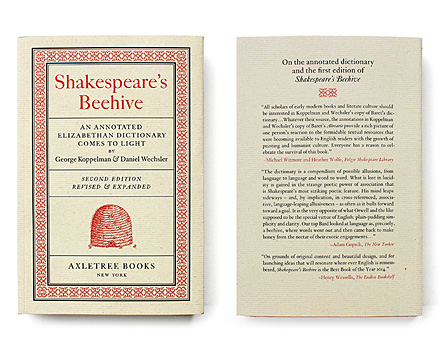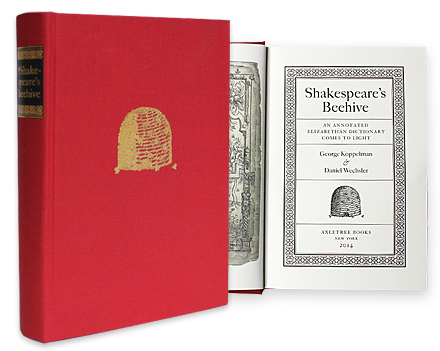Selected Press
RECENT PRESS ABOUT SHAKESPEARE’S BEEHIVE
CBS Sunday Morning: A 400-year-old Shakespearean mystery
William Shakespeare was honored the world over yesterday on the 400th anniversary of his death. What if this man of words left behind a treasured book of words? And what if two experts believe they OWN that book of words? Questions for us to ponder — with Martha Teichner.
Emory Magazine: Such Stuff As Dreams Are Made On
In the world of antiquarian bookselling, most dealers are specialists who have spent years developing expertise in a genre, a period, or both. Daniel Wechsler 90C is a rarer breed—a generalist who cares less about first editions than about the backstory of a book. What interests him most are the relationships between books and their readers: what books mean to people and how they use them. “Whenever there’s a personal connection between the owner and the book,” he says, “I’m interested.”
–Julie Schwietert Collazo, Emory Magazine
The Millions: The Bard’s Book? An Epic eBay Buy
On the morning of April 29, 2008, George Koppelman, a former IBM software developer who founded Cultured Oyster Books about 15 years ago, ate a late breakfast in his New York City apartment and then sat down at his desk to begin the day’s work. He logged on to eBay and input some search terms that produced a curious result: a 16-century English folio dictionary with contemporary annotations. Neat, but not necessarily remarkable. Except, said Koppelman, the annotations “seemed to me as if they were intentionally entered as poetic fragments.”
–Rebecca Rego Barry, The Millions
Clocktower Radio Podcast
Pete McCabe in conversation with rare book collectors and authors George Koppelmanand Daniel Wechsler whose book Shakepeare’s Beehive: An Annotated Elizabethan Dictionary Comes to Light analyzes a 1580 copy of Baret’s Alvearie, or Quadruple Dictionary and concludes that it was the great playwright’s personal copy and had profound influence on his writing. The trio delve deep, point by point, on the evidence from handwriting to spelling to phrases and usages that match verse in Shakespeare’s plays with curious coincidence. Enough to convince you? Fascinating and, no surprise, controversial.
Studio 360 with Kurt Andersen
William Shakespeare’s plays and poems are the first sources for scores of our present-day words, from ‘archvillain’ to ‘watchdog’ (though recent research has called some of our etymologies into question). For decades, scholars have speculated that Shakespeare’s go-to reference book was a popular late 16th century dictionary in four languages, John Baret’s Alvearie.
Late Night Live
Daniel Wechsler talks to Phillip Adams in an extended interview on Late Night Live, ABC Radio (Australian Broadcasting Corporation).
The Guardian
“The website is hugely thorough, and the dictionary itself is rather stunning.”
–Alison Flood, The Guardian
WNYC News
The world is celebrating William Shakespeare’s 450th birthday this week, and joining in are two New York City bookstore owners: George Koppelman and Daniel Wechsler.
Forbes
“It will surely become part of the canon of information currently available, and perhaps inspire further inquiry or become a stepping stone for something greater.”
–Sunday Steinkirchner, Forbes
774 ABC Melbourne
Two New York antiquarian booksellers believe they have discovered Shakespeare’s dictionary. Daniel Wechsler talks to Red Symons about the discovery of the ancient book.
This Old Book with Dan Dwyer
Daniel Wechsler talks to Dan Dwyer on This Old Book Radio Show and Podcast.
CBC Canada Radio
On April 29, 2008, two New York booksellers, George Koppelman and Daniel Wechsler, placed a bid online for an old dictionary — John Baret’s “Alvearie” which was published in 1580. Koppelman talks to Carol Off on As It Happens, CBC Canada Radio.
The Endless Bookshelf
“The ordinariness of the individual annotations is, to me, precisely what argues for their authenticity: they form not a rough draft of any single text, but a tool kit. The connections between Baret’s word store and the plays and poems all point to the transformation that occurs in the space between an author’s notes and composition: the play of language.
It is only April…But readers, there can be no doubt: on grounds of original content and beautiful design, and for launching ideas that will resonate where ever English is remembered, Shakespeare’s Beehive is the Best Book of the Year 2014.”
–Henry Wessells, The Endless Bookshelf
The Atlantic
“The finding could add a great deal of knowledge to contemporary understandings of Shakespeare.”
–Robinson Meyer, The Atlantic
Folger Shakespeare Library
“All scholars of early modern books and literate culture should be interested in Koppelman and Wechsler’s copy of Baret’s dictionary. The owners of this book have done the world a service by creating a website where these annotations can be studied. Whatever their source, the annotations in Koppelman and Wechsler’s copy of Baret’s Alvearie provide a rich picture of one person’s reaction to the formidable textual resources that were becoming available to English readers with the growth of printing and humanist culture. Everyone has a reason to celebrate the survival of this book, and indeed, all early modern books that have been preserved to illuminate this remarkable moment in our past.”
–Michael Witmore and Heather Wolfe, Folger Shakespeare Library
The New Yorker
“The dictionary is a compendium of possible allusions, from language to language and word to word. What is lost in lucidity is gained in the strange poetic power of association that is Shakespeare’s most striking poetic feature. His mind leaps sideways—and, by implication, in cross-referenced, associative, language-leaping allusiveness — as often as it bulls forward toward a goal. It is the very opposite of what Orwell and the like supposed to be the special virtue of English: plain-pudding simplicity and clarity. Our top Bard looked at language as, precisely, a beehive, where words went out and then came back to make honey from the nectar of their exotic engagements…”
–Adam Gopnik, The New Yorker
Official Press Release
George Koppelman and Daniel Wechsler Expand Their Argument and Present New Evidence in the Second Edition of Shakespeare’s Beehive: An Annotated Elizabethan Dictionary Comes to Light.
For more Shakespeare’s Beehive updates, follow us on Facebook and Twitter.



